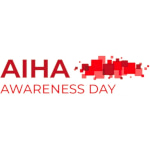AIHA Awareness Day Date in the current year: March 25, 2026
 AIHA Awareness Day is held annually on March 25 to raise awareness of autoimmune hemolytic anemia and other acquired hemolytic anemias. It brings together patients, their caregivers and families, physicians, researchers, and other stakeholders to advocate for policies that improve patient care and fund research.
AIHA Awareness Day is held annually on March 25 to raise awareness of autoimmune hemolytic anemia and other acquired hemolytic anemias. It brings together patients, their caregivers and families, physicians, researchers, and other stakeholders to advocate for policies that improve patient care and fund research.Hemolytic anemia is a type of anemia caused by the abnormal breakdown of red blood cells (hemolysis). It can be congenital (present at birth) or acquired (developed at some point in a person’s life). Acquired hemolytic anemia can be divided into four main types:
- Autoimmune hemolytic anemia, in which the immune system produces antibodies against the patient’s own red blood cells.
- Alloimmune hemolytic anemia, in which the immune system produces antibodies directed against the red blood cells of another person (common examples include Rh disease or reaction to an incompatible blood type during a blood transfusion).
- Traumatic hemolytic anemia, in which red blood cells are destroyed by physical injury, infection, or toxin.
- Paroxysmal nocturnal hemoglobinuria, in which red blood cells are destroyed due to a deficiency of the DAF protein, which is important for the normal function of cell membranes.
Autoimmune hemolytic anemia (AIHA) is a relatively rare disease with an incidence of 0.45 to 10 cases per 1 million people per year, depending on the type (warm-antibody, cold-antibody, mixed, drug-induced). However, this does not make it any less serious; in severe cases, the patient’s red blood cell life may be only a few days instead of the normal 100-120 days.
AIHA can be primary (idiopathic), meaning it occurs on its own with no known cause, or secondary to another disease. Secondary AIHA can be caused by other autoimmune diseases, leukemia, lymphoma, or infections, especially respiratory infections. In about half of all cases, the exact cause of AIHA cannot be determined.
Autoimmune hemolytic anemia is treated depending on its severity and underlying cause. First-line treatment typically includes steroids, such as prednisone, to suppress the immune response. If steroids are ineffective or the condition is severe, immunosuppressants (such as rituximab) or intravenous immunoglobulin (IVIG) may be used. In some cases, splenectomy (surgical removal of the spleen) may be considered.
For patients with cold agglutinin disease, avoiding exposure to cold and using medications such as rituximab may help, while steroids are rarely used due to their low effectiveness in treating this type of AIHA. Blood transfusions may be necessary for severe anemia, but are used cautiously because of the risk of further immune reactions.
AIHA Awareness Day was created to celebrate the resilience of patients living with acquired hemolytic anemia, educate the public about this rare disease, promote research, and advocate for better patient care. You can get involved by spreading the word on social media using the hashtag #AIHAAwarenessDay and donating to an organization that supports patients with AIHA.
- Category
- International Observances
- Tags
- AIHA Awareness Day, international observances, awareness days, autoimmune hemolytic anemia, rare diseases